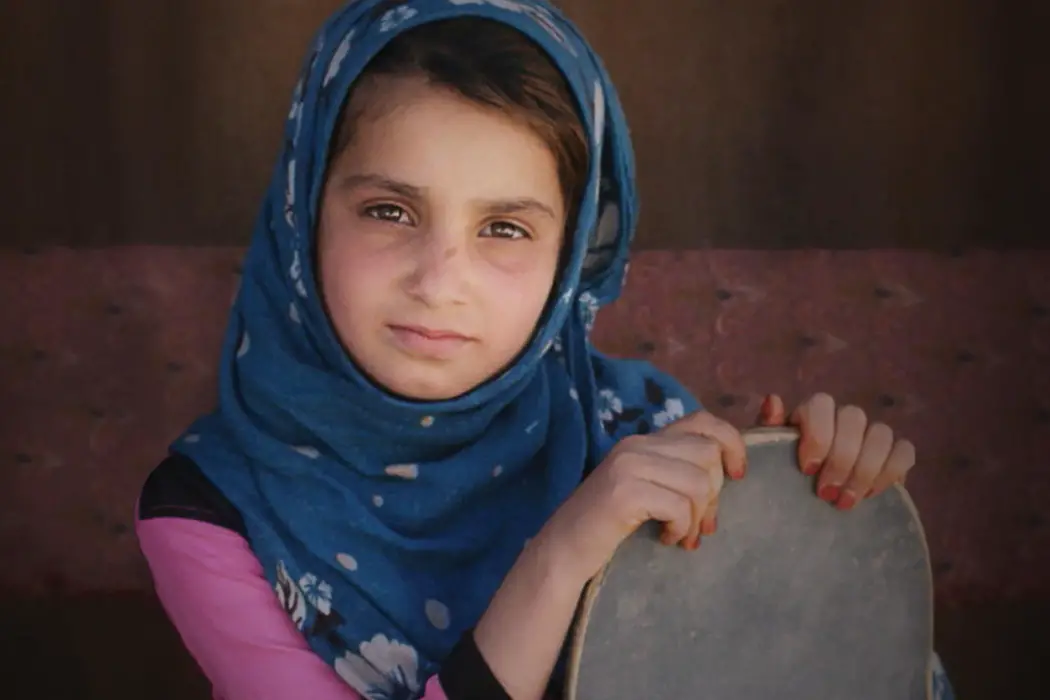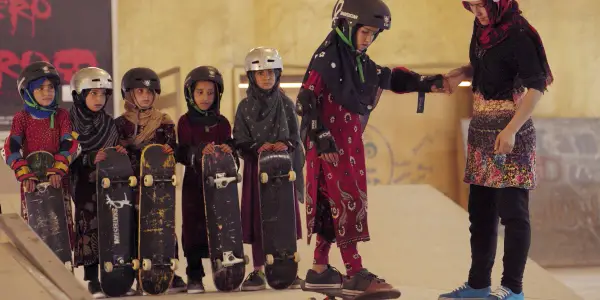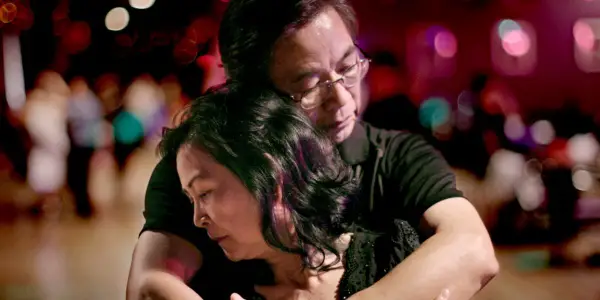2020 Oscar Documentary Shorts: Justice, Freedom & Bravery Dominate

Stephanie Archer is 39 year old film fanatic living in…
We are days away from the big night, and we are back with our final Oscar nominated short film recap. With the live action and animated shorts covered, it is time to close out the trifecta with the 2020 Oscar Documentary shorts.
Learning to Skateboard in A Warzone (If You’re A Girl) (Carol Dysinger)

The fight for human rights is a fight that is raging in all shapes and forms throughout the world. Learning to Skateboard in A War Zone (When You’re A Girl) zeroes in on the fight for equality for women, specifically in the oppressive environment of Kabul, Afghanistan. In a country where it is believed women should be seen and not heard, and violence can claim any chance of a future or marriage, the fight for equality for all women is quietly, but effectively being raged in the confines of a small skate park.
Here, in the face of those against progression for women, a small group bravely embraces each day, opening their doors to the children and young girls of Kabul who want to learn and obtain an education. Within these walls, students are taught reading, writing, math and the core values of bravery and courage. They are these values as they embrace the subjects that have been banned from the minds of the women before them.
But is not just bravery and courage that is taught in the classroom, but in the skate park as well. Each of the students is taught how to skateboard, an activity freely welcomed for the men in their community, but severely looked down upon for women. Here they take their board and face their fears both literally and metaphorically, flying past barriers and taking on limitless freedom.
One of the most important aspects of the short is the voice that it gives to not only the women who strive to better the lives of young girls, but to the students who brave each day to take a hold of the opportunity they have before them. No one’s voice is quieted, everyone who wants to speak is given the chance. The students’ voice are further empowered as they break free of their restraints, but also the women who run the school are further bolstered, giving them a platform to share their journey and their mission.
What was interesting too was the push of parents for their young girls to learn to read, write and to attend the school, Yet, there is also a sadness in the mothers who never had the chance their daughters currently do, there regret and desire for a better life giving them the courage to let their daughters go. As they talk about how it was like for them growing up, you see the progression building in a community that has had no regard for its female citizens. With the Taliban fallen, women are able to begin reaching further and begin taking chances. And this school is a part of what makes that possible.
As the Taliban has begun to rise again, there is a fear of returning to a world shrouded in cloth, silence and a lack of education. Yet, as the threat rises around them the teachers and students embrace each day and strive to progress, strive to be brave. To exemplify the courage they want to inspire in others.
Life Overtakes Me (Kristine Samuelson and John Haptas)

Where Skateboard focused on children who reside in war torn countries and environments, Life Overtakes Me found its youth removed from the horror, but straddling the lines of salvation and terror. Having witnessed horrors enough to permanently affect the minds and mentality of any adult, these children have unleashed a new power of preservation within the mind. Yet, where flight and fight leave us ready to launch into action, Resignation Syndrome brings life to a halt, leaving them in a sleep like state.
Much like Sleeping Beauty, these children are frozen in time and unresponsive, their parents left to not only worry about their uncertain future, but the future of their child as well. Life Overtakes Me gives three families the opportunity to share their story and to enlighten audiences to the trials and tribulations of refugees and how these have reshaped and evolved over time.
I had never heard of this syndrome before, but I found myself fascinated and dumbstruck by the power of the mind. While most of these cases are confined to Sweden, other cases have begun to spring up around the world, speaking to a changing environment and a changing anatomy.
The short also captures the dedication of the families that devote themselves to caring for their children, maintaining their health. Exercising their muscles, taking them out for fresh air and feeding times weigh on the family, but they never seem to waver. There is a true sense of family and what it means to be a part of one. Where they struggled to give their children better lives away from the violence of their country, here they will strive to keep that dream alive as they wait for them to wake up.
So the question remains as the documentary continues – do they ever wake up? For some yes. With the reassurance of security and safety, such as confirmed asylum, the children do wake up. They return to their regular lives with no memory of what had happened to them. For other children, families are still waiting. Out of the three families shown, only one of the children returned to her family, the other three still remain in wait for asylum and for their children.
As Netflix has begun to dip their toe into the short film medium this past year, I find an excitement that films such as this one will have the opportunity to reach larger audiences. With greater exposure of these impeccable films, stories such as these can be told and understood by the masses.
In the Absence (Seung-jun Yi)

On April 16, 2014, South Korea grieved as a country for the 300 plus souls lost to the sea – many of whom were school children. What initially seemed to be just an accident, however, proved to be far more complicated and far more horrific. Anger met with grief as questions began to rise, the resignation of a leader was called for and a captain did not go down with the ship.
In the Absence dives right into the moment of the ship’s initial sinking, voice over communication between the coast, first responders and the president accompanying the terrifying scene caught on tape. The ineffectiveness of their response is immediately present as the words spoken do not match what is being shown on screen. The film speaks to the failed efforts of South Korea’s handling of the wreck from the initial reporting to the devastating conclusion, followed by the abrasive nature that would come the government’s treatment of the disaster.
As the documentary continues, you will feel your heart sinking with the ferry, your emotions just as flooded. There is a raw display within the the film as it gives actual audio voiced over footage of the wreck – coupled with the videos students had posted as they followed the Captain’s instructions and stayed inside. As would be expected, the students showed compliance, following the leaders’ authority of those who would abandon them – the captain being the first to leave the ship. As you see the water rise in the surveillance cameras as the boat turns, you as a viewer, not an expert, know the chances of escape for those seeking shelter inside is slim.
Furthering your disbelief in the response from Korean first responders, their frantic attempts to save lives only kicking in at the final moments. As only a part of the bow is still above the surface, divers are enlisted to enter to see if any survivors had made it to the small remaining air within. Yet, an attempt to make things look successful for the president thwarts any remaining hope to save lives.
Where there is the callous treatment of the accident, there is a humanized dedication from others – a humble attempt to bring closure and peace. Volunteer divers spent months searching for the bodies of the lost so their families could bring them home and bring them to their final resting place. They were not commissioned by the government or by the families, they did it on their own.
Yet, as they dedicated their time, mentality and skill to the heart wrenching retrieval, authorities return to the forefront once more. With no explanation, the government forbids any diving for body recovery three months in. Even further crushing is when the In the Absence reveals in its final moments that one of these selfless individuals could not live with the gruesome discoveries and a presumed failure to accomplish his self-imposed mission, taking his own life.
While the country wins in its cry for their President to resign, questions still surround the before and after. Even as the boat is finally raised from the watery depths years later, families are kept away and answers seem to never come. This documentary’s final moments don’t bring closure, mirroring the families of the lost.
St. Louis Superman (Smriti Mundhra and Sami Khan)

Heroes come in all shapes and sizes – and many from the most unlikely of places. Enter rapper and activist from Missouri Bruce Franks. Following the events of Ferguson, MI, Franks would become the face of change for a community too often left behind by the overwhelming white majority government of the state. Further bolstered by his own experiences within the impoverished and violent community as a child, Frank decided to run for the House of Representatives, embarking on an uphill battle for change.
In a first nomination for MTV documentary Films, St. Louis Superman follows Franks as he attempts for the finale time to pass his bill in the House of Representatives declaring youth violence a public health pandemic. If successful, the new bill would open the pipeline for increased funding into the community for youth education and programs. With this bill, more children could be reached and saved.
As the documentary continues, you can see the resolve in Franks eyes, coupled with exhaustion that he seems to never be able to shake. And as the documentary shows, he has good reason for it. Tirelessly remaining a part of the community, Franks represents and emulates a government and a belief that change is possible. But for change to happen, to instill the same belief in others, Franks is a constant presence within the community – in both good times and bad times – at what viewers will come to understand was at his own detriment.
Like any superhero before him, he puts his community before himself, knowing he has the power to help. Yet, saturating himself into the world he has grown up within even further, but from a political perspective, creates its own battle within him. Coupled with unresolved emotions from the loss of his brother when he was younger and and the recent loss of his godson (both to the violence he is fighting), Franks found he could no longer provide for a community without taking care of himself.
As the documentary reveals, Franks resigned after three years of service, though it is not his departure that lingers as the credits roll, but rather what he was able to do in such a short amount of time, the people he was able help. Superheroes do not last forever, but the strongest have the most lasting effects.
Walk Run Cha-Cha (Laura Nix)

Sometimes the most endearing displays of love are those who have survived against all odds. For Millie and Paul Cao, their love has been tested to its limits, pushed forward for themselves and their future. Part of a New York Times Op-Doc series and as an opposition to anti-immigration legislation, Walk Run Cha-Cha shows the life changing effects immigration has provided for many, and the second chance it gives for a future.
Having immigrated from Vietnam, Millie and Paul now find themselves in successful careers, a successful marriage and finding freedom in the dance moves they have mastered. While their life looks like a shining example of success, this life they have created almost never was.
Having met when they were younger and living in Vietnam, their initial bond began when Paul asked Millie to dance, an activity illegal in their country. Through the rebellious actions of their youth, a relationship sprang to life, though one that would find itself tested shortly after. Paul and his family fled Vietnam, eventually finding their way to America and freedom. Unfortunately, Millie had to be left behind.
For six years, Paul did everything in his power to bring her to America – to him. And Millie, she waited, never wavering that he would make the seemingly impossible possible. With very little communication between them, they kept a flame lit, never faltering in their love and their faith. When Paul was able to finally bring Millie to the USA, their love was again challenged as this lack of communication and the time spent apart presented its own challenges once reunited.
Thankfully, they both still shared a love for dancing and ventured to share once again in the hobby, a tether for their relationship that attached to a foundation they could build off of. There is a warmth as they tell their story, their skill in dance displayed for audiences creating almost a fairy tale atmosphere.
In a season with heavy hitting shorts, this category included, it was a true joy to end on such a high note.
Does content like this matter to you?
Become a Member and support film journalism. Unlock access to all of Film Inquiry`s great articles. Join a community of like-minded readers who are passionate about cinema - get access to our private members Network, give back to independent filmmakers, and more.













